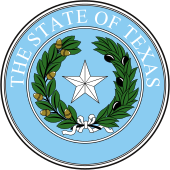HB 18 also known as Securing Children Online Through Parental Empowerment Act or just The SCOPE Act is an American law in Texas. The law requires internet platforms to verify the age of a parent or guardian of accounts if they are signed in as under 18. It also requires parental consent before collecting the data on minors under 18 years of age. Which is an increase from the age set at the federal level under COPPA which is 13. It also requires platforms to block and filter if the content promotes suicide, self-harm, eating disorders, substance abuse, stalking, bullying, or harassment, or grooming.[1][2][3][4][5]
| SCOPE Act | |
|---|---|
 | |
| Texas Legislature | |
| |
| Territorial extent | State of Texas |
| Enacted by | September 1, 2024 |
| Enacted | June 13, 2023 |
| Legislative history | |
| Introduced | February 16, 2023 |
| First reading | May 4, 2023 |
| Second reading | May 23, 2023 |
| Third reading | May 23, 2023 |
| Status: Not fully in force | |
Lawsuit against the act
editCCIA & NetChoice v. Paxton
editOn July 30, 2024, The trade associations The Computer and Communications Industry Association and NetChoice filed a lawsuit against Texas Attorney General Ken Paxton to the to block enforcement of the law to The Western District Court of Texas.[6] Judge Robert Pitman on August 30, 2024, blocked the block and filtering content requirements of the law. However, let the rest of the law take effect as the Plaintiffs didn't show evidence that the other parts of the law were unconstitutional.[7][8][9]
Students Engaged in Advancing Texas et al v. Paxton
editOn August 16, 2024, FIRE helped 4 plaintiffs to sue the Attorney General Ken Paxton. alleging that the law violated the first amendment.[10][11]
Lawsuits enforcing the act
editTexas v. TikTok
editOn October 3, 2024 Ken Paxton sued TikTok for violating The SCOPE Act demanding a trial and for penalties of up to 10,000 dollars per violation. TikTok denies that it violated the law.[12][13][14][15]
References
edit- ^ Texas Legislature Online - 88(R) History for HB 18
- ^ Texas HB 18: Scope Act aims to protect teens from harmful content | khou.com
- ^ Texas kids would need parental consent for social media under House bill | The Texas Tribune
- ^ 88(R) HB 18 - Enrolled version (texas.gov)
- ^ ABC SCOPE Act in effect
- ^ HB-18-Complaint_As-Filed.pdf (netchoice.org)
- ^ NetChoice Lawsuit KXAN News
- ^ Texas’ social media parental controls law partly blocked | The Texas Tribune
- ^ 2024-08-30-Order-Granting-In-dckt-25_0.pdf (netchoice.org)
- ^ FIRE Sues Ken Paxton, Alleging New 'SCOPE Act' Violates Constitutional Rights, Commerce Clause | Civil Society | The Texan
- ^ Students Engaged in Advancing Texas et al v. Paxton
- ^ TikTok Original Petition Filestamped.pdf (texasattorneygeneral.gov)
- ^ Texas sues TikTok over handling of minors' data (thehill.com)
- ^ Texas sues TikTok for violating children's privacy | Reuters
- ^ Ken Paxton sues TikTok for disclosing Texas minors’ data. | The Texas Tribune